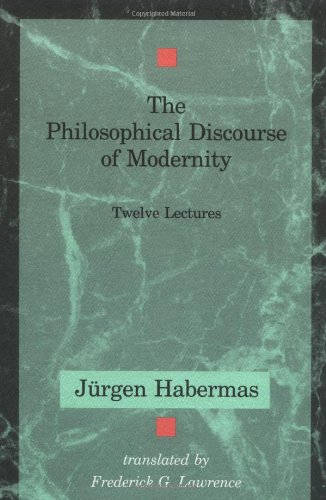The Philosophical Discourse of Modernity book
Par wiley gail le dimanche, mars 26 2017, 17:31 - Lien permanent
The Philosophical Discourse of Modernity by Frederick Lawrence, Jurgen Habermas, Thomas McCarthy


The Philosophical Discourse of Modernity Frederick Lawrence, Jurgen Habermas, Thomas McCarthy ebook
Format: pdf
Publisher: Polity Press
Page: 456
ISBN: 0745608303, 9780745608303
Habermas J., The Philosophical Discourse of Modernity: twelve lectures, MIT Press, 1991. Habermas, Jürgen, 1987, The Philosophical Discourse of Modernity, Frederick Lawrence (trans.), Cambridge: Cambridge University Press. Hegel, G.W.F., 1969, Hegel's Science of Logic, A.V. Everyday life is lived in the medium of cultural form. L., Islam, Gender and Social Change, Oxford University Press, 1998. The Philosophical Discourse of Modernity book download Download The Philosophical Discourse of Modernity It is regarded as an important contribution to. It begins by comparing Levinas' and Habermas' articulations of the philosophical problems of modernity. The Philosophical Discourse of Modernity Polity, 1987, Ch 1-4. This perspective is precisely part of a discourse of modernity that is established in the 19th century in the wake of the Industrial Revolution and becomes dominant in the USA after the Scopes trial in the 1920s. Scientific reasoning does not sit easily with the presuppositions of any religion, and the work of Enlightenment philosophers made the belief in God appear irrational…It is easy to imagine Mohammed Atta, at Hamburg . Postmodernism, one might say, is the revenge of the philosophical discourse of modernity upon Marixsm for neglecting problems in the philosophy of history. HABERMAS AND THE UNFINISHED PROJECT OF MODERNITY: CRITICAL ESSAYS ON THE PHILOSOPHICAL DISCOURSE OF MODERNITY. Jurgan Habermas, “The Entwinement of Myth and Enlightenment: Max Horkheimer and Theodor Adorno,” in The Philosophical Discourse of Modernity: Twelve Lectures, Cambridge: MIT Press, 1987, pp. 'Civil Society' and 'State' from Elements of the Philosophy of Right Cambridge University Press 1991, pp220-358. Jürgen Habermas also employs excursuses (the English plural; not “excursi,” if we followed the Latin) in his masterful overview, The Philosophical Discourse of Modernity (1987). (truth, power, normality, normativity). �Jürgen Habermas, The Philosophical Discourse of Modernity (1985; trans. Just as Schmitt accomplished this objective through the discussion on theology, Blumenberg did so in the philosophical discourse on modernity. This article examines Levinas as if he were a participant in what Habermas has called `the philosophical discourse of modernity'. Miller (trans.), London: Allen & Unwin, Ltd.